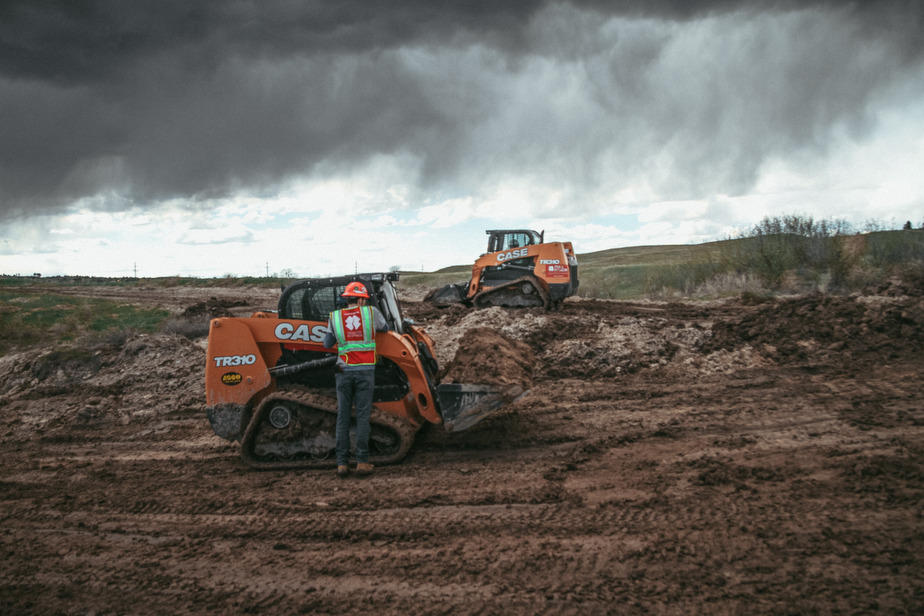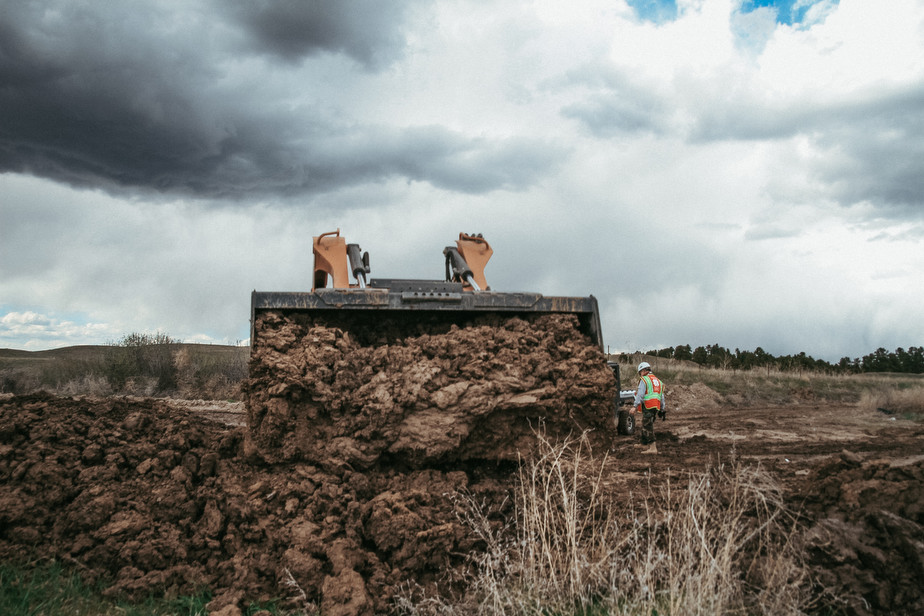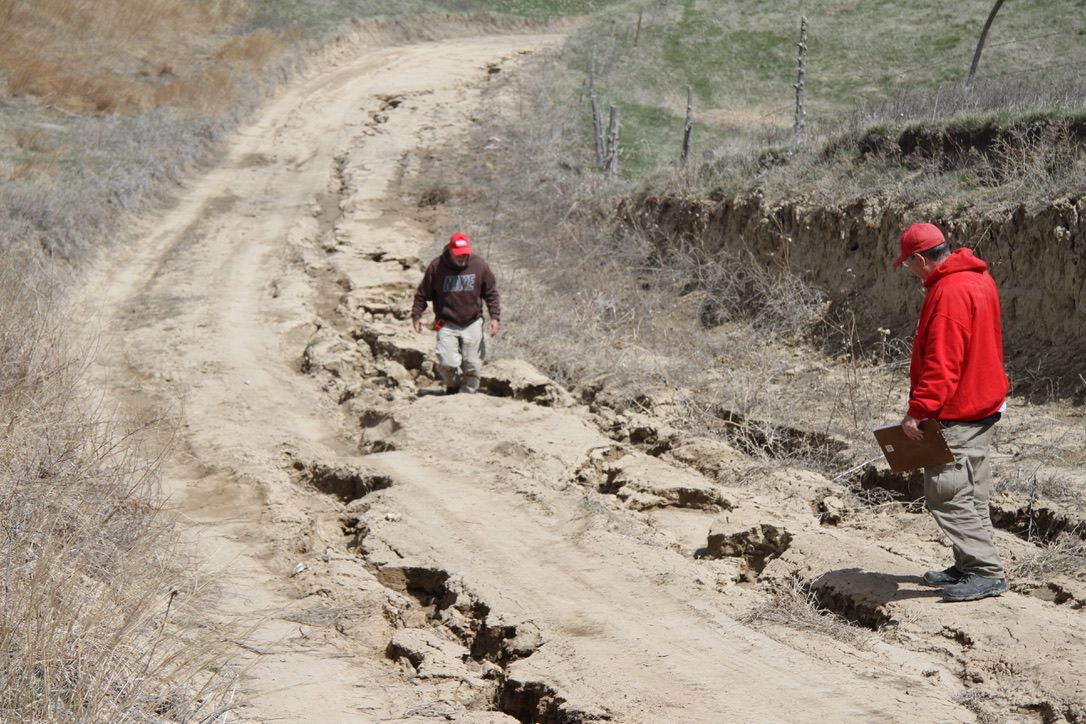The recent disaster that called you to deploy is far from your morning mind as first light hits your eyes on day one of your Op Anywhere deployment.
The stale air against your face has an unfamiliar taste. You smell socks. The outside of your sleeping bag is damp. You momentarily forget where you are in the world, and you say the op name in your head before looking around for a familiar face, perhaps spotting one among the group. As you sit up on your cot or bunk and swing your legs free of the sleeping bag, the cold floor comes up to catch your bare feet. The white bar on your grey shirt for your name is blank, and you don’t have a Sharpie. Because you arrived after lights-out, no one knows who you are yet either. Chow is at 0645. It seems strange to wonder where to brush your teeth, but you’re on an op in a disaster zone now.
In Good Company
Outside, the open land stretches for miles in every direction. There’s a row of CASE Skid Steers on trailers ready to go. A school bus is parked on the grass. Are you late? Outside the billets, other Greyshirts are congregating, so you’re all good. A smiling face approaches and says “howdy.” They’re also headed to breakfast, so you feel less alone.
You walk together across the forward operating base (FOB) to a shed-sized building with a patio and picnic tables, which are crowded with volunteers of all shapes and sizes in red sweatshirts and beanies that read “Team Rubicon” in large white letters. Wind causes your arms to tighten against your ribs and shove your hands into your pockets, but with it wafts the scent of bacon and cigar smoke. A cigar held by the swaying hand of an older man in a bomber jacket glows as he tells a story to a rapt audience. The group has worked together for days, but you’re new to the op. They share stories that help give you a sense of what you’ll see in the area—the flooded or washed out homes and roads. You can almost see the worksite. A door opens and you follow a line of folks—one of whom is a Greyshirt with a name like Shawn or Joe who recognizes your desert-camo look and asks where you served. You tell them. “Well Semper Fi, we got another Marine on the crew!” You’re fitting in—and there’s coffee.
Breakfast is better than you expected. The Incident Commander introduces you right as you shovel another mouthful of gravy-soaked biscuits; no one seems to mind. It’s your first daily briefing, including a safety reminder calling out a couple of names, which draws a good laugh. Apparently, you have to find a piece of paper called a 204 for your strike team assignment. Someone yells “get shit done” and everyone disperses to grab gear.
There’s laughter and excitement. Greyshirts in reflective vests and helmets attach thick chains to skid steers. Someone shouts, “another foot” and waves a driver of an F-150 onto a trailer. You meet members of your strike team, two older veterans with names like Vladimir and Steve who both seem to know their way around a Team Rubicon deployment. “Go ahead and toss that daypack in the truck bed there and let’s get this hog ready to go,” the Strike Team Leader says. The ATV is caked in mud and has to be tied down with tow straps. Your STL explains how bad the roads are where you’re headed, because of the flooding. Everyone piles into trucks and the mud-covered convoy rolls out.

Ready to Work
The landscape is unfamiliar and eerily gorgeous, even under thick clouds that appear ready to burst and fill already pooling water on the dirt roads. Tires kick up gravel and mud. From the brief, you learned that this reservation, which is home to the Sioux Nation, is on the lower end of the national poverty spectrum. You’re feeling eager to help in any way possible during the week ahead.
The convoy of F-150s arrives at the worksite where the skid steers are lined up and ready to go. The heavy equipment (HE) operators smoke their cigarettes and develop a plan of attack for the base of the hill where the dirt road begins. Today, your three-person strike team is tasked with navigating the road in ATVs to provide in-depth damage assessments on a road that at first glance looks like a washed-out hillside and appears non-traversable . “Saddle up,” your STL says.
The Polaris ATV bucks like a bull as it climbs the hill. The three of you are crammed aboard the cozy off-road vehicle, and over the engine noise, your new teammates share stories of their adventurous military careers. They’re interested to hear your own story—lots of road to cover, you figure. It’s rare that you feel comfortable enough sharing your experiences, but on a Team Rubicon deployment it feels different. The team comes to a section of the dirt trail with a wide groove dug out, as though a river had run right through, and you stop to document the damage with a camera, GPS coordinates, and notes. It’s agreed no normal vehicle could drive over it without getting trapped in the divot and soft mud; the road is useless. This is the same story every 25 yards for miles. It crosses your mind that there are clusters of trailer-style homes up in the hills with no alternative access points to a paved road.
“Will we get stuck?” you ask the team, which is parked before a long stretch of mud.
“Might, but we have a lot of road to get to,” one of your fellow strike team members says. “Let’s back up and hit it fast like a snowmobile and slide across.”
“Woooheee!”
“Seat belts.”
With the team on board, the machine picks up speed and skims the mud, banking to one side as you grip the roof, waiting to see if it straightens out. It does, and you reach harder ground. Climbing out, you remember there’s only one way back and to town where local families can take children to school and buy groceries. The group examines the mud pit and records the damage. To provide scale to the flooded trail you stand in the mud and sink almost to your knees as the STL snaps a photo. Sloshing your way out, the mud gives way to a nostalgic moment on patrol in the Middle East when your platoon picked a shitty, dangerous route in order to avoid IEDs. You’re among company who appreciate the story.

Assessing the Damage
The HE supervisor calls over the radio for a situation report. It’s been hours and your team has covered around six miles on day one with a stack of damage assessments on a clipboard speckled with mud. He advises your team to monitor gas and return shortly. “Roger that,” you respond.
The STL wants to map another 0.5 miles before heading back to the rally point, and with plenty of gas, the mission pushes on. Deep ruts, mud, holes, and wash-outs that span more than a football field, disrupting driveways and property, are among the hazards the Native American people who call these hills their home have had to face since the massive winter storm struck.
An older woman walks from her home when she sees your team on the road. She’s happy to learn about Team Rubicon. You ask about the flooding. She describes overwhelming rainfall and having to dig a ditch in the rain to move water away from her yard. She hopes she’ll be able to use the road again soon.
On the trek to rally with the HE teams you picture the older woman digging a ditch in her yard and feel a sense of responsibility to return the next morning and complete the remaining miles of damage assessments because the mission objective feels suddenly more personal. You hope your strike team’s work will provide adequate information to acquire the necessary rock fill and machinery for the road repairs ahead. The HE guys look amazed at the amount of mud your strike team accumulated throughout the day. It feels good. You hear Vladimir describe the damage to the road in the hills that they can expect to meet with skid steers soon enough. It’s a long drive back to the FOB which allows for ample opportunity to relive the moments your ATV nearly flipped in a rut with your strike team who already feel like close friends.

Camaraderie and Laughter
Back at the FOB, you follow the lead of experienced Greyshirts who unpack and clean their gear. Later as everyone heads to dinner, you notice a new feeling, different than the walk to breakfast, a sense of relief to be a part of the team and not the new guy anymore—though it’s been one day—when a voice calls you to wait up. It’s a Greyshirt with a name like Bernie or Don from the other strike team.
“What’s up, man!” you say, shaking hands.
“Ready for some chow,” he says. “Heard you guys ran into a rough patch of road today.”
Others rush over to meet up and the herd of hungry men and women who just spent their days in the mud descend on the kitchen shed. The FOB has an expansive feel with a peaceful church and other small buildings placed on miles of open prairie. The dusk is alive with camaraderie and laughter, but also somber tones of disbelief at the scenes witnessed earlier. The food is hardy and tastes delicious, and there’s enough for seconds while you listen to the Incident Commander’s debrief. He or she asks for a story from the day or about your first day’s experience on deployment with Team Rubicon, and a number of things cross your mind. Whatever you go with in the moment, it is exactly what the crowd of Greyshirts staring at you is hoping to hear, because you’re out there together on Op Anywhere.
It gets dark quickly and with it, the temperature plummets on the barren landscape, so Amanda, Brian, or Kevin lights a fire—everyone’s huddled around it and you know you want in. Around the fire, you realize you haven’t checked your phone all day, and it feels wonderful. You listen to stories, learn where those sharing the fire with you are from, why the Army, Navy, or Marine Corps is the better branch, why MREs are actually not bad if you think about, which team should’ve been in the Super Bowl instead, and whether a shower’s worth the 300-yard cold walk back to the billets. Showers are overrated anyway is the consensus.
You pull out a book and plop down on your rack around 2030 but find reading difficult with so many new friends around and conversations to join. The mood in the air is far from sleepy, despite exhaustion. Expect an aroma in the air similar to when you arrived—the scent of socks and dedication. Someone turns off a light, and the headlamps flicker on. Conversations transition to whispers, and you remain awake to hear more life stories from your strike team members in adjacent racks. Inevitably, the fellow Greyshirts you’ve been keeping awake with questions call it quits and go to sleep. You’re one of the last to turn off the headlamp. And as you stare at the ceiling in a symphony of snores, you play back your entire first day on a disaster response deployment.



